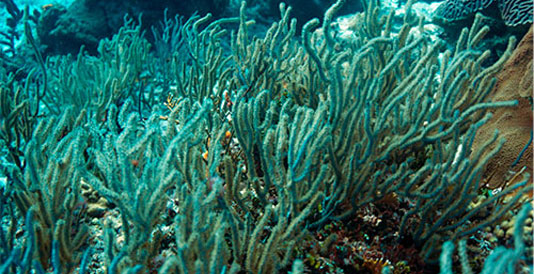 December 8, 2014 - A new study on tropical shallow-water soft corals, known as gorgonians, found that the species were able to calcify and grow under elevated carbon dioxide concentrations. These results suggest that Caribbean gorgonian corals may be more resilient to the ocean acidification levels projected by the end of the 21st century than previously thought.
December 8, 2014 - A new study on tropical shallow-water soft corals, known as gorgonians, found that the species were able to calcify and grow under elevated carbon dioxide concentrations. These results suggest that Caribbean gorgonian corals may be more resilient to the ocean acidification levels projected by the end of the 21st century than previously thought. An international team of scientists, including from the University of Miami (UM) Rosenstiel School of Marine and Atmospheric Science (RSMAS), tested the effects of elevated CO2 concentrations on the growth and calcification rates of the sea rod, Eunicea fusca, a type of gorgonian or soft coral found throughout the Bahamas, Bermuda, South Florida and into the Gulf of Mexico. Researchers collected E. fusca specimens from Big Pine Shoals in the Florida Keys to simulate a range of predicted future ocean acidification conditions – CO2 concentrations from 285-2,568 parts per million (pH range 8.1-7.1) – during a four-week experiment at the UM Rosenstiel School’s Coral Reefs and Climate Change Laboratory. Eunicea fusca showed a negative response to calcification under elevated CO2 concentrations, but growth and calcification did not stop under any of the CO2 levels used in the study.
Full UM RSMAS Press Release and Video
Related Miami Herald Article
Photo Caption: Eunicea fusca, Curacao. Photo Credit: Juan A. Sanchez – Universidad de los Andes, Bogota Colombia












